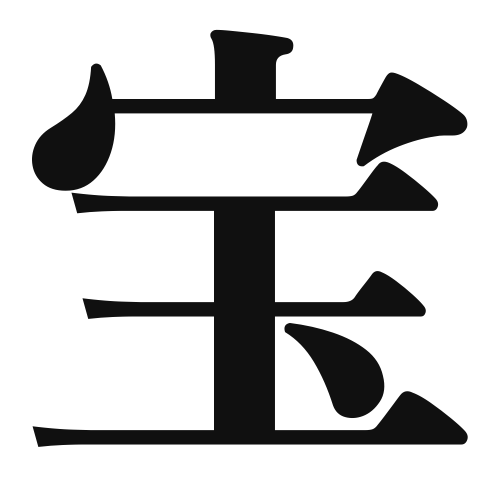1. Overview of Meaning
The kanji “宝” (pronounced “takara” in Japanese) means “treasure” or “precious.” It represents something valuable, whether it be material wealth, cherished possessions, or intangible qualities like love and friendship.
2. Formation and Radical
The kanji “宝” is a compound character (会意文字) that combines two elements: the radical “宀” (meaning “roof” or “house”) and “寳” (which is a variant of “宝”). This suggests that treasures are often kept safe within a home.
The radical “宀” indicates a connection to shelter or protection, emphasizing the idea of safeguarding valuable items.
3. Examples of Usage
Common words and phrases that include “宝” are:
- 宝物 (たからもの, takaramono) – “treasure” or “valued possession”
- 宝石 (ほうせき, houseki) – “gem” or “jewel”
Example sentence in daily conversation:
「この宝物は私の家族から受け継いだものです。」
(“This treasure was passed down to me from my family.”)
4. Synonyms and Antonyms
Similar kanji with related meanings include:
- 財 (ざい, zai) – “wealth” or “assets,” which refers more to material wealth than the emotional or sentimental value of “宝.”
Antonyms include:
- 無価値 (むかち, mukachi) – “worthless,” indicating something that has no value or significance.
5. Cultural and Historical Background
The concept of “宝” is deeply rooted in Japanese culture, where treasures are often associated with family heritage and personal values. In Japanese folklore, treasures can also refer to mythical items that grant power or happiness.
Proverbs and idioms related to “宝” include:
- 「宝の持ち腐れ」 (たからのもちくされ, takara no mochi kuzure) – “a treasure that is not used,” meaning something valuable that is wasted or not appreciated.
